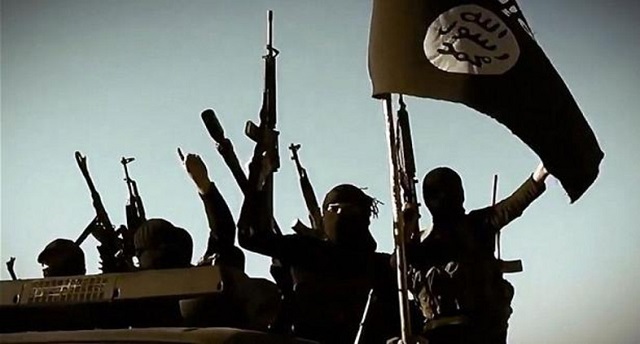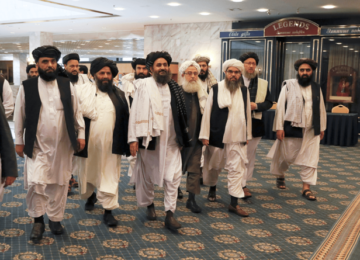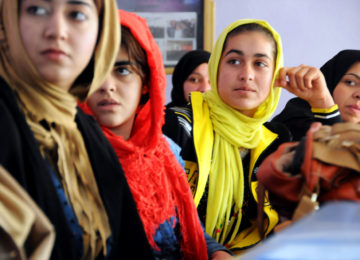January 03, 2018
– US policies are different in different countries
Who is supporting whom and where creates a confusing mosaic of conflicting interests, regional hegemony and a game of power. One of the more recent examples is of US covert ops supporting Islamic Fundamentalism in Afghanistan to cut through the Russian influence. What has followed as a result of this disastrous policy is a growth of fundamentalists turning extremists turning militants ripping across not only the very fabric of the Afghan society but also leading Pakistan into the quagmire. The secular government of Afghanistan was overthrown as a result thereof. Interestingly, United States has also extended support to Islamic militants in many countries of the world including the Caucasus, Kosovo, Bosnia, Libya and Syria.
United States overthrew governments in Libya as well as in Iraq with Syria being an ongoing saga. Mr. Obama said: “Two things: one is, ISIS is a direct outgrowth of al-Qaeda in Iraq that grew out of our invasion. Which is an example of unintended consequences. Which is why we should generally aim before we shoot. Where a young man who is growing up has no education and no prospects for the future, is looking around, and the one way that he can get validation, power, respect is if he’s a fighter. And this looks like the toughest gang around, so let me affiliate with them. And now you’re giving me a religious rationale for doing this.”
This is not the only negative cascading effect. Over a million refugees of the wars started by United States are spread over different countries in the world.
Let’s take the case of Syria: Both Russia and Iran support President Bashar al-Assad’s regime. Moscow has leased a naval base at Tartus. It is the only base Russia has in the Mediterranean for her Black Sea Fleet. Russia also has forces at Latakia. Syria is also the transit point for Iran’s shipment to Hezbollah, the Lebanese Shia Islamist movement. United States has always supported the opposition alliance the National Coalition; the US also provides military assistance to what she calls the “moderate rebels.” The National Coalition can by no long shot be deemed as “moderate”.
Those moderates were sidelined a long time ago when the opposition escalated into a full blown war. Gulf States and Qatar have extended support to the opposition, rank and file of which is extremists in nature including the al Qaeda–affiliated Jabhat al-Nusra. Reports state that the US has bombed ISIS in Syria simultaneously damaging Syria’s oil producing facility and other infra-structures. US has supported Syrian rebellion aimed to bring down the regime of President Bashar al-Assad, that then went out of control and escalated into a civil war.
According to a declassified secret US government document, the governments from west deliberately allied with not just al-Qaida but also other extremist Islamic outfits to overthrow Bashir al-Assad.
This is not all; the decision of United States to arm Kurdish forces of fighting Islamic State in Syria can lead to a worse mess in Syria. For Turkey these Kurdish forces are terrorists. Erdogan has often repeated his allegation of U.S forces operating alongside a terrorist insignia”.
The former U.S. Secretary of State Hillary Clinton wrote in a December 2009 leaked diplomatic cable that entities in Saudi Arabia were the “most significant source of funding to Sunni terrorist groups worldwide.”
Yet the United States keeps mum because the Saudi monarchy serves U.S. interests. Due to its pivotal role in OPEC, it makes sure that crude oil prices don’t rise above a certain level. It is a key purchaser of American weapons. It invests in U.S. government bonds. And it has acted in the past as proxy for covert U.S. actions, such as funneling arms and funding to the Nicaraguan contras.”
The important point is that powers support different groups and governments depending upon their own regional and economic interests at different times. Who is a friend today is an enemy when these interests change and vice versa. It’s not about counter terrorism all the way. It’s a mix of reasons.
Legitimizing the actions that support interests’ of a nation that are neither ethical nor moral in nature do not make it so. For any action to be taken against another sovereign state the basic question that must be answered in all honesty and correct intelligence reports must be if the action considered is proportional to the threat considered.
The author Yasmeen Aftab Ali is a lawyer, academic and political analyst. She has authored a book titled ‘A Comparative Analysis of Media & Media Laws in Pakistan.’ She can be contacted at: yasmeenali62@gmail.com and tweets at @yasmeen_9
Disclaimer: Views expressed on this blog are not necessarily endorsed or supported by the Center for Research and Security Studies, Islamabad.








